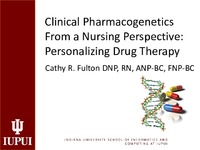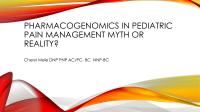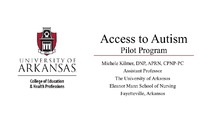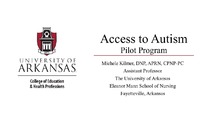| dc.contributor.author | Manworren, Renee | en |
| dc.date.accessioned | 2016-07-13T11:04:34Z | |
| dc.date.available | 2016-07-13T11:04:34Z | |
| dc.date.issued | 2016-07-13 | en |
| dc.date.issued | 2016-07-13 | |
| dc.identifier | INRC16B01 | |
| dc.identifier.uri | http://hdl.handle.net/10755/616107 | |
| dc.description | Theme: Leading Global Research: Advancing Practice, Advocacy, and Policy | en |
| dc.description.abstract | Session presented on Thursday, July 21, 2016: Purpose: Explore the potential for translating our emerging knowledge of genetic associations with pain sensitivity and analgesic metabolism to a personalized medicine approach to pediatric pain management. Methods: Candidate genes from two groups of pediatric patients were interrogated for associations with pain sensitivity and analgesic efficacy phenotypes. Candidate genes were selected based on previously identified associations with altered pain sensitivity in experimental pain and clinical pain syndromes (COMT, FKBP5, GCH1, OPRM1, OPRD1, TRPA1, TRPV1) and with altered analgesic metabolism (CYP2D6, CYP2C9, CYP2C19, CYP3A4, CYP3A5). Individual variability in pain experiences, use of opioids and opioid effectiveness will be illustrated. Patients with chronic pain (N=19) complicated by analgesic inefficacy and adverse analgesic effects were retrospectively tested for CYP2D6, CY2C19 & CYP2C9 genetic variants. Subsequently, (N=60) adolescents' post-operative pain after posterior spinal fusion for idiopathic scoliosis or thoracoscopic repair of pectus excavatum was prospectively studied for genetic associations with both genetic variants in pain sensitivity and analgesic metabolism. Results: Significant CYP2D6 genetic variants were identified in 84% of the chronic pain patients: 4 were ultra-rapid metabolizers, 8 deficient metabolizers, 3 poor metabolizers and 1 a null metabolizer. Of the three patients with functional CYP2D6 status, two were CYP2C19 null metabolizers. It is predicted that pediatric patients with alleles associated with high pain sensitivity would report more severe pain intensity, require more opioid analgesics, and experience more analgesic adverse effects; but the interaction of genetic variation in pain sensitivity and alterations in analgesic metabolism may critically influence and explain variability in individual pain experiences. Conclusion: The high prevalence of severe pain after surgery, potential for long-term pain and adverse effects of analgesics highlights the need for better predictors and strategies to treat both acute and chronic pediatric pain. If we can preemptively identify patients at greatest risk for pain and adverse analgesic effects, we can recommend: 1) against truly elective surgical procedures to correct non-life threatening or life-limiting anomalies, or 2) treatment with genetically suitable analgesics. Other potential translations include opioid addiction risk modeling. Further research is needed to integrate pharmacogenetic and clinical findings into anticipatory guidance for genetic testing and analgesic prescribing to children with pain. | en |
| dc.format | Text-based Document | en |
| dc.language.iso | en | en |
| dc.subject | pharmacogenetics | en |
| dc.subject | pain management | en |
| dc.subject | personalized medicine | en |
| dc.title | Translational Genomics for Predicting Pediatric Pain Outcomes | en |
| dc.title.alternative | Pain-Omics Across the Lifespan | en |
| dc.rights.holder | <p>
All rights reserved by the author(s) and/or publisher(s) listed in this item record unless relinquished in whole or part by a rights notation or a Creative Commons License present in this item record.
</p><p>
All permission requests should be directed accordingly and not to the Sigma Repository.
</p><p>
All submitting authors or publishers have affirmed that when using material in their work where they do not own copyright, they have obtained permission of the copyright holder prior to submission and the rights holder has been acknowledged as necessary.
</p> | |
| dc.description.note | Items submitted to a conference/event were evaluated/peer-reviewed at the time of abstract submission to the event. No other peer-review was provided prior to submission to the Henderson Repository. | |
| dc.type.category | Full-text | en |
| dc.contributor.department | Mu | en |
| dc.author.details | Renee Manworren, APRN-BC, PCNS-BC, FAAN | en |
| dc.conference.name | 27th international Nursing Research Congress | en |
| dc.conference.host | Sigma Theta Tau international, the Honor Society of Nursing | en |
| dc.conference.location | Cape Town, South Africa | en |
| dc.date.conferenceyear | 2016 | en_US |
| dc.description.reviewtype | Abstract Review Only: Reviewed by Event Host | en |
| dc.description.acquisition | Proxy-submission | en |





